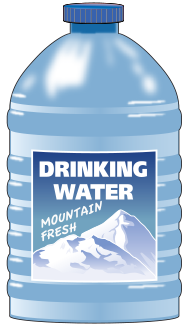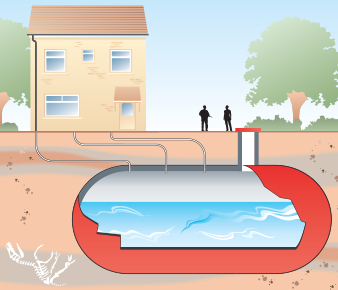A central pillar of the 90-day survival plan is having enough supplies to survive in isolation from the world for the entire period. There is a chance that you could forage an abandoned home after a few weeks, but you should exercise frugality to be self-sufficient in your home fortress in terms of food, water and other supplies.
As a zombie survivalist, you need to start asking some searching questions about your current set-up such as how much food do I currently keep in the house? Do I have a good place to store supplies and, most importantly, do I really think I could last for a few months on one carton of orange juice and a box of cornflakes? More than any part of the 90-day survival plan, laying down stores requires planning and ongoing management. Most items will need to be rotated according to date and you’ll need a dry, dark and cool place to store most food items.
Remember to personalise your supplies. If you hate tinned peas then there is no reason to see out the apocalypse almost spewing every time you force them down. Stock what you enjoy within the main food groups and adjust your stock to take into account any special dietary requirements.

Self-sufficiency living is not just about big-time gardening, it’s a whole approach and something you can start implementing immediately. The first step is to identify the key ‘inputs’ into your home – so we are talking about fruit, vegetables, meat, fish, water etc. Basically, everything you can currently just go to the supermarket for and top up whenever you please. Self-sufficiency living is about gradually reducing your dependency on these external sources. For example, is there a nearby field with a secure fence which may be suitable for larger scale gardening? Do you have space for a greenhouse which could guarantee you fresh produce all year round and do you have the necessary skills to catch wild animals such as rabbits to supplement your meat intake? Work to gradually develop your level of self-sufficiency now in preparation for the zombie apocalypse and it won’t be such a shock when the dead arrive. Try to build a library of information in areas such as gardening and the smallholder management of livestock. The possibility of catching fish from a nearby river or lake is tempting but depends very much on the number of bodies floating in the water. Most zombie experts expect main waterways to be blocked with the bloated corpses of the dead so you may want to hold the fish for the moment!

The key in food storage is planning. Firstly, consider the number of survivors you are likely to have, then map out a 3–4 month period of isolation. Secondly, plan the main meal for each day per person. Be conservative with portions and keep a balanced diet for an active person. Don’t forget to include treats and to mix things up or there is a risk that after the third straight week of watery gruel, your fellow survivors may be willingly walking into the arms of the hungry dead just to escape your cooking.

The following items are suggested when selecting emergency food supplies. You may already have many of these to hand.
- Ready-to-eat canned meats, fruits, vegetables and a can opener – fresh vegetables will be hard to come by as the distribution network collapses and will be a welcome treat.
- Protein or fruit bars will often replace a lunchtime meal. After a busy afternoon bashing zombies, you’ll need a snack.
- Dried milk powder – the miracle substance and heart of a thousand survival recipes. Ensure you have ample supplies.
- Peanut butter packed with the power of this glorious nut, is a great snack on dried biscuits.
- Dried fruit – will keep much longer than fresh fruit. Just look at those dried dates you got from an Auntie a few years ago – they’re still as delicious now as the day you were given them.
- Crackers – a great way to boost up any meal and perfect for snacks.
- Canned juices – again, you will need these to ensure a balanced diet.
- Food for infants – don’t forget if you have little ones or anyone requiring a special diet, you need to plan for this.
Some survival supplies offer a complete 90-day food supply and they range from around £600 per person. You may also opt for dried military rations if you really want to be hardcore.
Here’s a handy list of foods that can be stored for over 3 years in the right containers and conditions:

- Wheat
- Vegetable oil
- Corn
- Baking powder (you can never have enough)
- Soya beans
- Instant coffee, tea
- Cocoa (this is a must have)
- Salt
- Non-carbonated soft drinks
- White rice
- Dry pasta
- Powdered milk (in nitrogen-packed cans) – an essential
- Apparently, baked beans in a tin can last over 15 years. We’re not sure whether this is a comfort or not
- Honey and sugar if correctly stored will last for years and liven up many a dull survival meal
- Dried apple slices may not sound like much of a treat now but they’ll last for years
- Dehydrated carrots aren’t the tastiest but they do the job
Do not be disheartened if you currently have low stocks. Most people today shop on an almost daily basis and are quite used to picking what they want, whenever they want it at the drop of a hat. Start to change your mindset now and build your food stocks up slowly if funds are tight. Create your vegetable patch now and start practising your survival recipes right away. Any sudden change in diet can be a serious shock to your body – imagine moving your survivor group onto your cabbage-based survival diet only to be driven out of your sealed fortress by the mixture of a non-functioning toilet and the unpleasant vapours from your fellow survivors.

To be on the safe side, you should allocate one gallon of clean water per adult per day. In purely survival terms, this is generous and other factors such as climate and level of activity will play a part. The ‘one gallon a day’ calculation includes a small allocation for washing and sanitation. It is important that you should never let your water supply drop below a three-day supply per person in your group.

- Commercial firms can provide tanks of over 2000 gallons if you are serious about securing your supply.
- Rainwater can be collected for washing or sanitation, but be cautious of water from a stream – always boil it and use a purifier, particularly if it smells a bit ‘corpsy’.
- There is a reservoir of water in the heating system and tanks in most homes – make sure you trap it.
- When things kick off, run and fill every bath you have in the house – this can provide a useful reserve.
- Maintain strict water-usage discipline at all times.

5 Reasons Why Survivors Venture into Zombietown
Any journey into bandit country will be dangerous, but figures collected by the Ministry of Zombies reveal the top five reasons why survivors leave their fortified homes during zombie outbreaks. These findings were based on research into more than 100 documented incidents since 1946.
- We ran out of water so I went to forage.
- Food was low and I wanted a bit of variety.
- I was feeling claustrophobic.
- I couldn’t stand being trapped with those people any longer.
- I just fancied getting some fresh air.
Apart from the fact that some of these responses are sheer lunacy, running out of water is the number one reason why survivors leave the safety of their shelter and put themselves at risk on the zombie-dominated streets. Clearly, this shows that most survivors seriously underestimated their requirements in terms of water.
Preparing a 90-day survival plan will take time and resources, and when you are on a limited budget it makes sense to concentrate on home fortification, food and water as the priorities. In addition, it’s always worth putting a small budget aside for other items – not just the crucial stuff like tools, extra wood, nails and any medicines but also books, games and those little luxuries that make life worth living.
If there are children in the house, consider how you are going to keep them entertained during those long dreary nights – perhaps a collection of classic children’s books and toys. Once your e-reader packs up, you’ll be back to good old paperbacks so keep a good stock as they can also be useful as kindling for a fire. You can use your powerless e-reader to put plants on, or as a small chopping board.
In addition to these, start building up a library of survival textbooks now – knowledge of first aid, growing your own crops and basic mechanics will become invaluable. It may be an idea to create a ‘planning room’ in your home where you can store all your books and plans. If you’ve always wanted one of those rooms you see on TV shows, with photos pinned to the wall and bits of blue string joining things up – this is your chance. Get your survival plans organised and use the planning room for meetings with your survival team. It will help to create the air of seriousness required among the group and make you look like an expert or lunatic depending on the observer.
Here’s a quick ‘don’t forget’ list of essentials put together by a team of survival experts – these are items people typically forget:
-
Wind-up radio
To keep updated with any emergency broadcasts.
-
Toilet paper
You’ll thank us for this one.
-
Shampoo
You can battle the dead and still have coconut fresh hair.
-
First aid box
Well-stocked. Check dates on the tablets.
-
Extra blankets
For when the heating is out.
-
Garbage bags
You can never have enough of these.
-
Matches
Loads of matches.
-
An entertainment box for the kids
Including crap board games with pieces missing and old children’s books that will put the zombies to sleep.
-
Another blanket
Someone spilt something on the first one.
-
Wind-Up Torch
These cheap items could be a life saver if you find yourself needing light in an emergency. They aren’t very bright but they do the job.

What happens when the lights go out?
Few people in the developed world live without some form of power in their home and one thing you can be sure of is that once the zombies are in town, it’s only a matter of time before the power grid goes down. Survival experts disagree on how long it will last in the aftermath of the apocalypse so it’s best to plan for it being out from day one. Invest in a basic portable generator and lay down enough fuel to last you at least a few months. A small generator on average will use about a gallon a day if used continuously. Below is a list of items you can power with a portable generator (5000 watts per hour)
- Central air-conditioning (5000 watts)
- X-Box (200 watts)
- Standard TV (190 watts)
- Computer (120 watts)
- Monitor (150 watts)
- Laptop (200 watts)
- Hot plate (1200 watts)
- Oven (3000 watts)
- Popcorn popper (1,600 watts)
- Average lightbulb (25 watts)
- Your illuminated Captain Kirk water feature diorama (7,500 watts of wasted energy)

Obviously, you can’t have everything on at once so budget your energy provisions carefully. In addition, a well-lit house amid the darkness will be an open invitation to any bandit out there that you are well supplied and comfortable – expect a visit from your local looters just as your popcorn is popping in the maker. No one knows exactly how long the power will stay on when the dead rise. Research has shown that many of our power stations, including the nuclear ones, can continue for weeks unmanned before auto shutting down. As part of your survival preparations, it is prudent to have several practice weekends without power to really grasp the impact it has on a survival group.